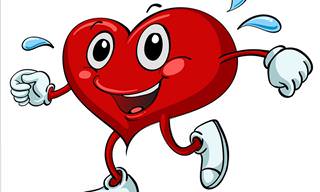A rapid heart rate, known by professionals as tachycardia, takes place when an adult's heart begins to beat at more than a hundred beats per minute. It can be a frightening affair since you may find it hard to breathe and your chest could feel like something is fluttering within it. This article will help you work out whether or not you have tachycardia, and if so, what you can do about it.
Everyone has their own standard resting pulse rate, which is defined as the total number of heartbeats a person experiences in one minute at rest. It generally lies somewhere between 60 and 100 beats per minute but can change over time depending on your fitness levels and age.
If your hearts beats less than 60 times a minute, it doesn't automatically mean that you should be worried. It's rather common for professional athletes or gym-goers to have low heart rates that hover around 60 or less, and this is because a fit person's heart doesn't need to work so hard to pump blood around the body.
Certain types of medication, such as beta blockers, can cause your heart rate to slow down, however, you should monitor your heart rate on a daily basis if you are taking any prescription medications that could affect the heart. Your doctor will need to know about heartbeat fluctuations, especially if they are connected to any drugs that you are taking.

On the other hand, a heart that beats too quickly is far more likely to imply an underlying health issue. This could be the result of anxiety, emotional issues, fever, caffeine overuse, drug abuse, rigorous physical activity, extreme terror, or even anemia.
If your quickened heartbeat is accompanied by any of the following symptoms, then you should seek immediate medical attention:
• Dizziness
• Fatigue
• An unexplained illness
• A racing pulse
• Chest fluttering, pressure or tightness
If your racing heart does not appear to be a medical emergency, then you can slow it down by splashing some cold water on your face, meditating, or performing deep breathing exercises. Regular episodes could be due to habits such as drinking alcohol, consuming too much caffeine, or smoking, so you might want to consider cutting them out of your life.
In order to measure your heart rate, make sure you are at rest before placing your index and third fingers on your neck beside your windpipe. You can also check it by placing your two fingers between the tendon and bone over your radial artery, located on your thumb's side of the wrist. Whatever method you choose to adopt, simply use a stopwatch to time yourself for 15 seconds, while you count each beat out loud. When you're ready, simply multiply your result by 4 to find out what your true heart rate is.

Once you get into the habit of regularly checking your heart rate, you'll get a good idea of what your regular heart rate is, which will make it a lot easier to diagnose future heart issues, too. You may also choose to get your cardiovascular system in better shape by setting a target heart rate to aim for. Of course, in order to achieve your goal, you'll need to start exercising on a daily basis for a minimum of 20 to 30 minutes each day.
Make sure you share this important medical information with your friends and family, too.
Source
Images
 Go to BabaMail
Go to BabaMail























































